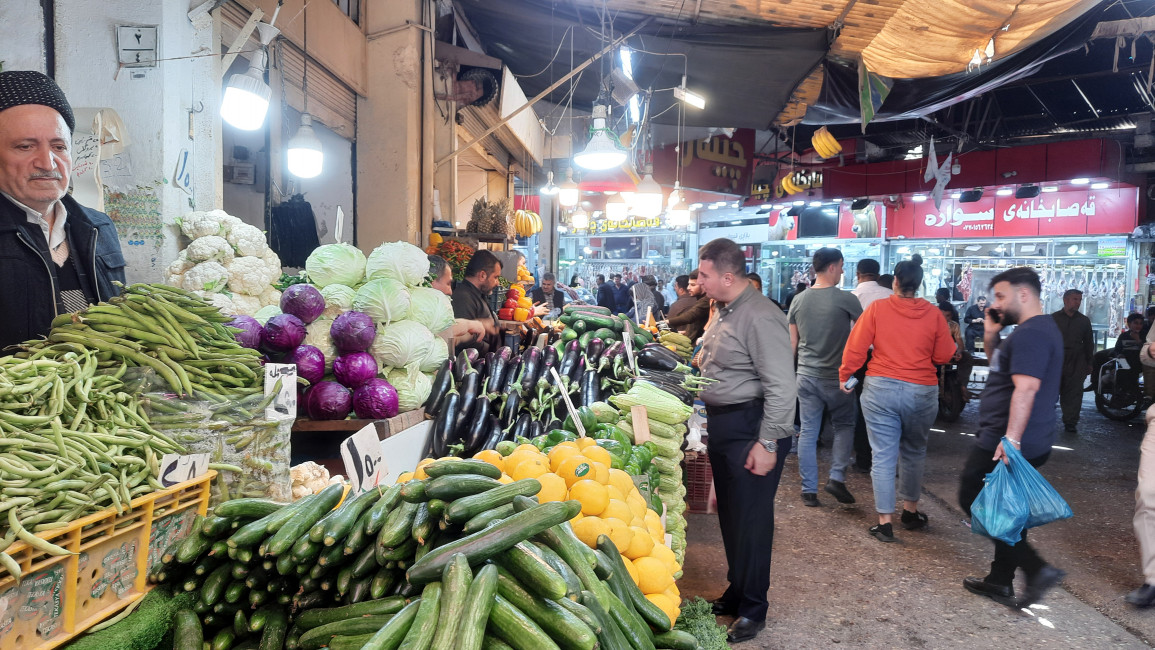Iraqis welcome Ramadan in the dark with empty plates
Iraqis across the country are welcoming the holy Muslim month of Ramadan with mixed feelings, as prices of basic foodstuffs increase and fuel and electricity cuts intensify this year.
During a tour of one of the main markets in Sulaymaniyah city, The New Arab commonly heard from shoppers complaining about skyrocketing prices of foodstuffs, high unemployment rates and the lack of payments by the Kurdistan Regional Government (KRG).
The KRG has been administering the semi-autonomous region of northern Iraq since 1992, with much of its funding dependent on exporting nearly 500,000 barrels of oil per day.
Recently, the KRG has been struggling to pay more than 1,200,000 employees on its public payroll, with salaries for March yet to be distributed.
"For many in the country, this Ramadan feels very different from the previous ones. There are more crises and grievances, and a very high rate of inflation compared to last year," Rebaz Hussein, a 32-year-old, Kurdish citizen from Sulaimaniyah told The New Arab in midst of his shopping.
"Last year, we had similar issues related to high prices and people had some savings. Now, the prices have increased sharply but our salaries are delayed. People are buying less than in the past," he added.
To tackle this growing crisis, the Iraqi parliament is currently debating a draft law to urgently support the poorest Iraqi families facing food insecurity.
"As Ramadan kicked off, prices of daily essentials such as fruits, vegetables, meats, poultry, have increased. These high prices are not affordable to citizens, especially when we receive a salary every two months," Ari Ali, an employee at the KRG ministry of electricity, said to The New Arab while buying tomatoes priced at 1,500 Iraqi dinars (nearly US$ 1) per kilogram.
Ali also dismissed the notion that the current inflation was the result of the Russian-Ukraine war, noting that prior to the war residents were already facing immense hardships.
"The Kurdish people have been suffering since 2014 when the KRG started exporting its oil independently from Baghdad to the international markets," he said.
For his part, Falih Mahdi Darwish, an Iraqi citizen from Baghdad who was visiting Sulaimaniyah as a tourist, said to The New Arab that he found the prices in the north better and not as expensive in comparison to the Iraqi capital.
Iraq imports most of its wheat from Russia or Ukraine to make bread, since locally produced wheat "was not proper for making bread", according to various bakery owners who spoke with The New Arab.
Prior to the Russian invasion of Ukraine, one sachet - amounting to 50 kilograms - of Russian flour was sold at 25,000 Iraqi dinars (around $US 17), but currently the same flour is being sold with 45,000 Iraqi dinars (roughly $US 30).
Nawzad Kamil, director-general of trade at the Iraqi Kurdistan's ministry of trade and industry, last month told The New Arab that "The Russia-Ukraine war not only affected Iraq, but also the entire Middle East and Europe. We assure our citizens that our stores are full of food items. We are also distributing foodstuffs via the food rationing [system] on a daily basis."
Further adding to Iraqis woes in the country are increasing fuel shortages and long hours of power cut, mainly centred around the middle and southern parts of the country as the temperature noticeably rises, and a scorching summer seems to be ahead.




